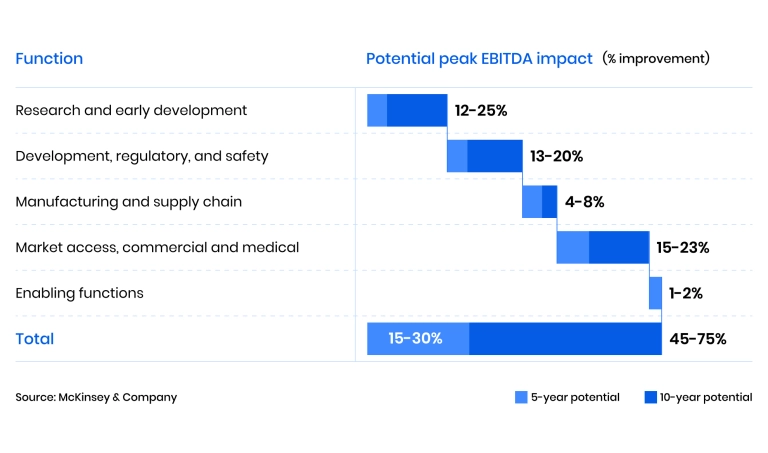BI in pharma helps pharmaceutical companies turn complex datasets into actionable insights, improving decision-making and operational efficiency. From drug development to distribution, Business Intelligence tools streamline processes and enhance outcomes at every stage.
Advanced analytics shows tremendous promise for pharmaceutical companies. Broader adoption of data-driven technologies could boost operating performance by 15–30% of EBITDA within five years. Over the next decade, the improvement could reach 45–75%, underscoring the transformative potential of these tools in the industry (Source ).

This article highlights three practical use cases of pharma business intelligence, detailing its role in advancing drug development, compliance, and supply chain optimization. You'll also learn about the benefits and challenges of using BI, along with complementary technologies that maximize its potential. Want some more insights? Check out our big data analytics in the pharmaceutical industry article. In this one, you will learn:
- Three key applications of BI in pharmaceutical operations;
- The benefits and challenges of adopting BI tools;
- Technologies that enhance the impact of BI.
Read on to see how BI transforms the pharmaceutical industry and drives efficiency.
Use cases of business intelligence in the pharma industry
Business intelligence in pharma enables companies to extract actionable insights from complex data, improving efficiency and decision-making across various operations. From clinical trials to marketing strategies, it supports data-driven innovation at every stage. Below are three detailed use cases where BI transforms pharmaceutical processes.
1. Clinical data analysis
Clinical trials are data-intensive and require precise management. BI here provides tools to:
- Streamline patient recruitment: BI systems analyze demographic and medical data to identify the most suitable candidates for clinical trials.
- Monitor trials in real time: Dashboards consolidate ongoing trial data, helping researchers track progress and make necessary adjustments.
- Predict trial outcomes: Predictive analytics anticipate potential issues or results, reducing trial errors and improving success rates.
This accelerates drug development and ensures trials are conducted efficiently and accurately.
2. Providing financial analysis
Effective financial management is essential in the pharmaceutical sector. BI systems support this by:
- Optimizing budgets: Analyze spending patterns across R&D, manufacturing, and distribution to allocate resources more effectively.
- Enhancing profitability forecasting: Predictive tools estimate the financial outcomes of new drugs or product lines, helping prioritize investments.
- Tracking expenses in real time: BI dashboards provide visibility into ongoing costs, ensuring adherence to financial plans.
These capabilities highlight how pharmaceutical business intelligence improves financial performance and decision-making.
3. Improving marketing strategies
Marketing in pharma requires precision to meet regulatory requirements while reaching the right audience. BI in the pharmaceutical business enhances marketing strategies through the following:
- Targeted audience analysis: BI tools identify specific customer segments for tailored campaigns, such as healthcare providers or patient groups.
- Competitor insights: Analyze market trends and competitor performance to refine product positioning.
- Campaign performance tracking: Real-time analytics measure the effectiveness of marketing efforts, allowing for on-the-fly adjustments.
This results in more effective campaigns that maximize ROI and improve market penetration.
4. Optimizing supply chain management
BI tools simplify supply chain operations, ensuring products are delivered efficiently and on time. Key applications include:
- Demand planning: Analyze historical and market data to forecast product needs accurately.
- Inventory optimization: Maintain balanced stock levels to prevent shortages or excesses.
- Route and logistics optimization: BI systems track shipments in real time and optimize delivery routes, reducing transit times and costs.
These improvements drive efficiency while ensuring patients receive the needed medications without delay.
5. Enhancing regulatory compliance
Pharma companies operate under strict regulatory standards. BI tools help by:
- Maintaining compliance records: Store and retrieve compliance data for audits and inspections.
- Proactive risk management: Identify potential compliance risks early to avoid penalties.
- Automating reporting: Generate accurate reports to meet regulatory requirements with minimal effort.
With these capabilities, BI reduces regulatory risks and simplifies adherence to global standards.
Transform data into action with our business intelligence services
Exploring real-life BI examples
AstraZeneca improved production efficiency with BI
AstraZeneca partnered with SAS to improve the efficiency and quality of its Turbuhaler production. The project leveraged business intelligence in the pharmaceutical industry to create a solution capable of managing vast amounts of data from multiple systems.
"The goal was to increase yield, improve quality, minimize variations, and save time," SAS explained. The system automated data management and analytics across AstraZeneca's 26 global plants, ensuring cost-effective and quality-assured production.
The solution handles over 170 million rows of data daily, growing by 1.5 million rows weekly. "Using SAS, we have been able to minimize variations in the production process and expand the scope of our analyses," said Henrik Åkerblom, a process engineer. This example highlights how business intelligence pharma industry tools can empower organizations to streamline operations, enhance productivity, and provide actionable insights for continuous improvement (Source ).
Pfizer Australia boosts sales strategy using advanced BI
Pfizer's Australian branch turned to Complexica's business intelligence pharma software, Larry the Digital Analyst, to refine its sales and marketing strategies. Integrated with tools like the What-If Simulator and Optimizer, Larry enabled Pfizer to model market conditions, such as seasonal demand fluctuations or retailer performance, and optimize sales territories based on geography, size, and team roles.
The software's machine learning model, trained on thousands of data points from sales and marketing campaigns, analyzes key factors like customer profiles and market trends. This allows companies to identify high-value opportunities, determine effective investments, and plan optimal times for promotions.
Predictive tools like Larry exemplify business intelligence use cases in pharma, where advanced analytics enhance decision-making. These applications align with broader trends in business intelligence in healthcare , where data-driven solutions are transforming operations (Source ).
Moderna enhances clinical trials and logistics with BI solutions
In 2016, Moderna implemented Google Cloud's Looker to improve organization-wide access to secure and reliable metrics. The platform allows Moderna to analyze internal data (such as clinical operations and demographic trends) and external medical datasets. This approach enables the identification of study trends and enhances the diversity of clinical trials.
Moderna also leverages Looker and Google's AI tools to optimize logistics, managing over 60,000 shipments annually, and conducting sentiment analysis to improve client support. These tools have become integral to streamlining operations and enabling more informed decision-making across the company (S ource ).
By integrating BI into core operations, pharmaceutical companies can enhance their efficiency, optimize resources, and maintain a competitive edge in the market.
The benefits of adopting BI in pharma
Implementing business intelligence tools in the pharmaceutical industry offers numerous advantages, enhancing operations across multiple areas.
Based on the use cases explored, here are the key advantages:
- Enhanced decision-making: BI systems consolidate data from multiple sources, providing actionable insights for critical decisions in R&D, manufacturing, and marketing.
- Increased efficiency: Automating data collection and analysis saves time for employees, allowing them to focus on innovation and problem-solving rather than manual processes.
- Improved clinical trials: BI tools help identify trends, optimize patient recruitment, and monitor trial progress, reducing costs and improving success rates in drug development.
- Optimized supply chain management: Real-time visibility into logistics and inventory levels ensures timely deliveries, minimizes waste, and prevents disruptions.
- Cost savings: Predictive analytics identify cost-saving opportunities in production, logistics, and marketing, maximizing the return on investment.
- Regulatory compliance: Centralized data management and automated reporting simplify adherence to complex regulations, reducing the risk of penalties and delays.
- Personalized marketing and customer insights: BI tools analyze customer behaviors and preferences, enabling targeted campaigns and improved engagement with healthcare providers and patients.
- Scalable solutions: Modern BI systems are adaptable, allowing companies to expand their analytics capabilities as data volumes grow and new challenges emerge.
These benefits illustrate why BI is becoming a cornerstone of innovation and efficiency in the pharmaceutical industry.
Challenges of using business intelligence in pharma
While business intelligence offers significant advantages, its implementation in the pharmaceutical industry comes with challenges:
- Data integration issues: Pharma companies often deal with siloed data stored in multiple systems, making integration a complex and resource-intensive task.
- Regulatory complexity: Adhering to stringent compliance standards across different regions adds an extra layer of difficulty to BI system deployment and operation.
- High implementation costs: The initial investment in BI tools, infrastructure, and training can be substantial, posing a barrier for smaller companies.
- Data security and privacy: Managing sensitive patient and clinical data requires robust security measures to prevent breaches and ensure compliance with privacy laws.
- User adoption: Encouraging teams to embrace BI tools and adjust workflows often requires extensive training and a shift in organizational culture.
Overcoming these challenges is the key to fully leveraging the transformative potential of BI in the pharmaceutical sector.
What other technologies might be useful?
When implemented in the pharmaceutical sector, business intelligence can be significantly enhanced by integrating it with the following technologies:
- Artificial Intelligence and Machine Learning: AI/ML models process large datasets to uncover hidden patterns, automate predictions, and improve decision-making in areas like drug discovery and marketing.
- Big Data Platforms: Advanced data storage and processing systems, such as Hadoop or Spark, handle the enormous volumes of data generated by clinical trials, supply chains, and market analysis.
- Internet of Things: IoT-enabled devices, such as manufacturing equipment sensors or supply chain temperature trackers, provide real-time data that BI tools can analyze to optimize operations.
- Cloud Computing: Cloud platforms facilitate scalable BI solutions, offering storage, computational power, and tools for collaboration across global teams.
- Blockchain: Blockchain ensures secure, transparent, and tamper-proof record-keeping, especially for sensitive clinical trial data and regulatory compliance.
- Natural Language Processing: NLP capabilities allow BI tools to process unstructured data, such as research papers, clinical notes, or customer feedback, transforming them into actionable insights.
Integrating these technologies with BI creates a more robust system, enabling pharmaceutical companies to achieve higher efficiency and innovation.
Drive pharma innovation with Binariks' tech expertise!
Implement tech innovations in pharma with Binariks
Business intelligence is transforming the pharmaceutical industry by enhancing data-driven decision-making, optimizing clinical trials, improving supply chain efficiency, and refining marketing strategies. With growing volumes of complex data, pharma companies need robust BI solutions to extract meaningful insights, streamline operations, and maintain a competitive edge.
When integrated with AI, IoT, and cloud computing, BI enables predictive analytics, real-time monitoring, and process automation—leading to faster drug development, improved regulatory compliance, and enhanced patient outcomes. Harnessing these capabilities allows pharmaceutical businesses to navigate market challenges and reduce costs.
At Binariks, we help organizations unlock the full potential of their data through advanced analytics , data integration, and scalable BI solutions. Our expertise empowers companies—including those in healthcare and life sciences—to implement technology-driven strategies for sustainable growth. Whether you want to enhance decision-making, improve operational efficiency, or modernize legacy systems, our team can provide tailored solutions to meet your needs.
Let's discuss how we can support your BI initiatives and drive transformation in your business. Contact us today to get started.
Share

